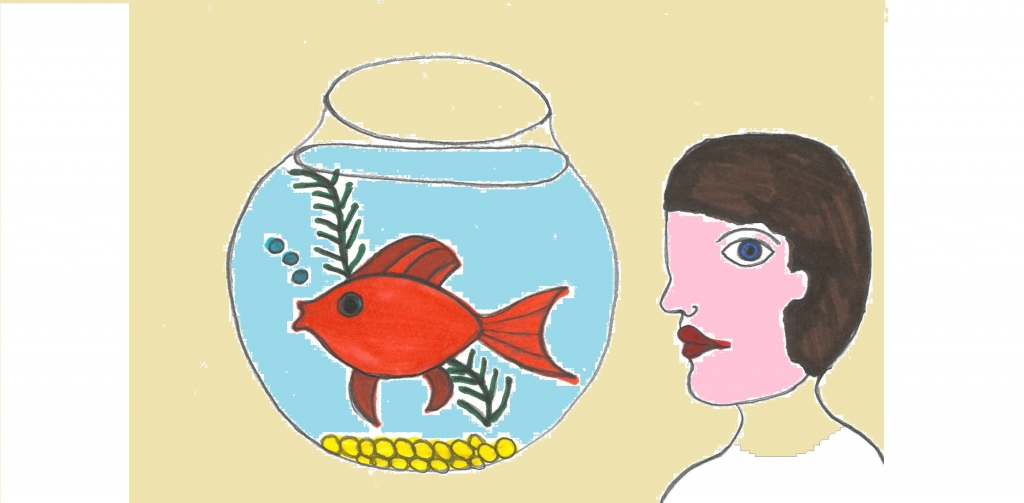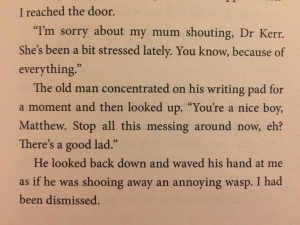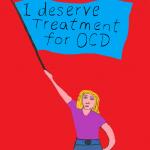Book Review: The Goldfish Boy
April 12th 2017
It would be a great disservice to dismiss The Goldfish Boy as merely a detective-come-mystery adventure with a ‘touch of OCD’ thrown it for good measure, for it is so much more than that. Not only does it engage you with a captivating storyline, it gives you a literal and metaphorical window to peer through in which you bear witness to the deepest, darkest moments of despair in Matthew Corbin’s life at the hands (ironically) of OCD.
Without giving anything away, the story centres around a 12-year-old boy who lives with Obsessive Compulsive Disorder that affects every aspect of his life. Whilst being confined to his bedroom because of his illness, his only escape is observing the goings on of Chestnut Close, meticulously keeping tabs on what his neighbours are up to in his journal/notebook/diary. However, when a toddler goes missing from the cul-de-sac, Matthew takes it upon himself to investigate the disappearance, using his unique abilities to aid him along the way.
Matthew’s journey through adversity, overcoming his fears and attempting to reclaim his fragile existence is probably the most relatable piece of literature that I’ve ever come across. Although fictional, the portrayal of OCD is so accurate that the author, Lisa Thompson, might as well have looked at my life history and used snippets from it for inspiration. The level of detail in her writing and the way she articulates the raw and sheer anxiety that’s induced by OCD is remarkable. On more than one occasion, I was so impressed that I took pictures so I could refer back to them in my own time. After speaking with her privately, I became aware that Lisa doesn’t have OCD herself but was able to draw from her friend’s experience and also use what she learnt from talking to a therapist about the subject matter.
The above passage really got to me. After mustering the courage to go to the doctors, face the hurdle of leaving the safety of his house, get in the car and enter the building, the doctor has the audacity to say this to Matthew; “Stop all this messing around now, eh?”. It seems shocking but this has no doubt been heard by many people both young and old who have gone to their GP for help and have been treated like this. The lack of understanding in the medical profession when it comes to OCD is still something that surprises me but books like this, stories (albeit fictional) like Matthew’s are a great way of educating people and opening their eyes to the reality of this illness.
Lisa has described the intense, almost visceral emotion that I am all too familiar with when recounting Matthew’s worries about his bedroom window opening. Personifying the germs, giving them a sense of frivolity by having them skydive; this allows children to imagine it with ease. I fell back into my own pensieve of despair when I read this because I’ve been there; pulling my knees up, hugging my legs. I’ve sat in my room, scared of the window and what lies beyond. I was able to empathise with Matthew and I have Lisa’s writing and heart to thank for that.
However, for as much as The Goldfish Boy tackles the serious issue of living with a debilitating mental illness, it also breathes life into a rich, detailed micro-world with wonderfully bright characters brimming with intrigue and colour. One example of some much-needed brevity is Matthew’s friendship with Melody Bird, a fellow resident of Chestnut Close. Their graveyard scenes stole my breath and forced burning tears to traverse my puffy eyes and cheeks. Learning about each other’s secrets in a playful and often tearful way encouraged a smile as I turned the pages; each discovering new slivers of information gleaned from folded paper and whispered worries. I could go on but I really don’t want to spoil the book for you, dear reader.
My penultimate symposium is that of Matthew’s relationship with his parents; a father faltering to understand his son, a mother with unquestionable love and the best of intentions, both desperate to help their child who is evidently in pain, physically from the constant hand washing and contact with bleach and emotionally as a consequence of his isolation and inner torment. Whilst his father takes on a more brash and practical approach, Matthew’s mother is more subtle in the way she tries to help but both of them are unable to succeed. Their son has been keeping a secret so terrible, so nefarious that he is only able to be liberated once he reveals these thoughts, these intrusive mental telegrams to them.
Which leads me to my conclusion. In the final pages, Matthew’s secret is emancipated and in doing so, his world expands magnificently. I was an absolute mess towards the end of the book and cried my eyes out. I’ve never reacted this way to a book before and I immediately messaged Lisa to thank her for giving the world this precious gift, not realising it was in the early hours of the morning until the message was away and on the interwebs!
A literary tome of hope, a little bastion of victory over fear and doubt; I urge you with every fibre of my being to go out and purchase The Goldfish Boy. It doesn’t matter if you have OCD or not, this book is a tale of adventure, spirit, courage and kinship, all the while facing up to your demons.
Thank you, Lisa ❤
R.










